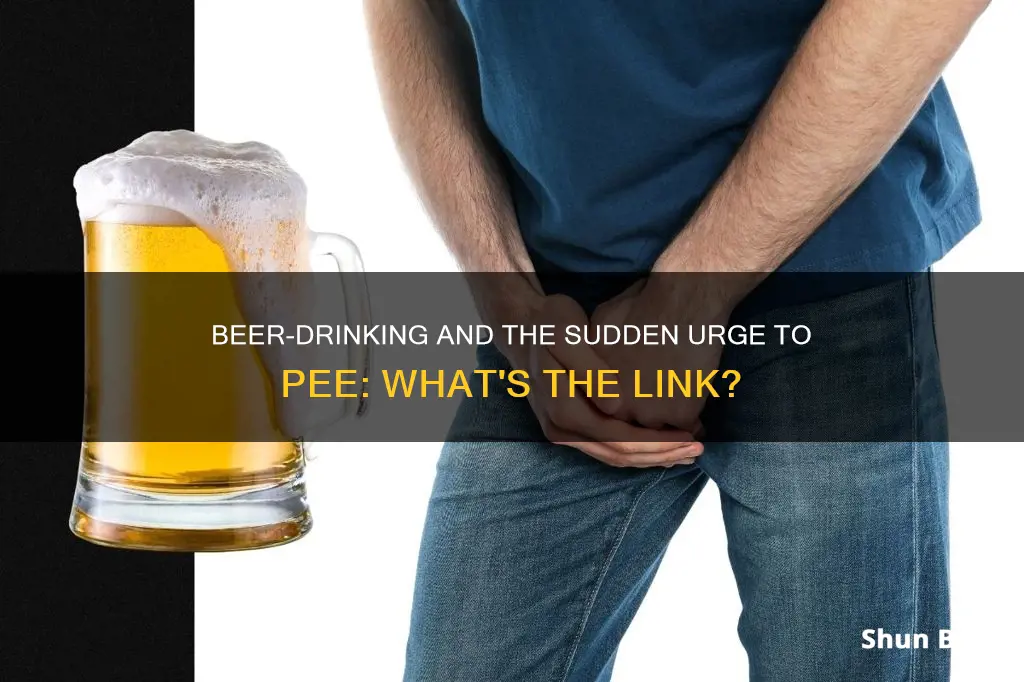
It is a well-known fact that drinking alcohol makes you need to pee more than usual. But why is that? Well, it turns out there are several reasons. Firstly, alcohol is a diuretic, which means it increases urine production. It does this by inhibiting the release of a hormone called vasopressin or antidiuretic hormone (ADH), which is responsible for promoting water absorption. With less vasopressin, the bladder fills up faster, and you need to pee more often. Additionally, alcohol is a liquid, so the more you drink, the more your kidneys will release urine to get rid of the excess fluid. The type of alcohol also matters – stronger drinks like spirits have a more pronounced diuretic effect than lower-alcohol beverages like beer. So, if you're drinking beer, you might not need to pee as often as you would with other alcoholic drinks.
| Characteristics | Values |
|---|---|
| Reason for increased urination | Alcohol is a diuretic, meaning it increases urine production. |
| How alcohol affects the body | Alcohol inhibits the release of the antidiuretic hormone (ADH) vasopressin, which tells the kidneys to hold on to liquid. |
| Effect of different types of alcohol | Spirits have a stronger diuretic effect than beer. |
| Effect of alcohol on sleep | Alcohol can cause sleepiness or blackouts, and the bladder continues to fill up while asleep. |
| Effect of alcohol on the bladder | Alcohol can relax the bladder muscles, causing leaks. |
| Effect of alcohol on the brain | Alcohol can cause the brain to send impaired signals to the body about needing the toilet. |
| Effect of alcohol on kidney function | Regular alcohol consumption can double the risk of kidney disease or damage. |
| How to avoid bedwetting | Drink alcohol in moderation, use the bathroom before sleeping, and ensure the bladder is empty. |
| How to avoid dehydration | Drink at least one glass of water for each serving of alcohol. |
What You'll Learn
- Beer is a diuretic, increasing urine production
- Alcohol inhibits the release of the antidiuretic hormone, vasopressin
- Alcohol suppresses the antidiuretic hormone (ADH)
- Beer displaces water, reducing the 'prompt' for the kidneys to release fluid
- Alcohol drains magnesium stores, impacting kidney and muscle function

Beer is a diuretic, increasing urine production
Beer is a diuretic, which means it increases urine production and promotes water loss through urine. When a person drinks beer, the alcohol in the beer inhibits the release of a hormone called vasopressin or antidiuretic hormone (ADH). This hormone is responsible for telling the kidneys to reabsorb water if the body needs it, rather than flushing it out through the bladder. By inhibiting ADH, alcohol causes the kidneys to release more water, leading to a dehydration effect.
The diuretic effect of beer can be influenced by various factors. Firstly, the type of alcoholic beverage matters. A 2017 study found that urine output increases when consuming stronger alcoholic drinks such as spirits compared to non-alcoholic beverages. Beer, which typically has a lower alcohol content than spirits, may have a less pronounced diuretic effect. However, it's important to note that the diuretic action of alcohol also depends on the individual's hydration levels before consumption. A 2010 study involving 12 males showed that those who were slightly dehydrated before drinking alcohol urinated less than those who were adequately hydrated, even when drinking the same amounts of alcohol.
Additionally, the frequency of alcohol consumption plays a role. When a person consumes alcohol regularly, the body adapts to the presence of alcohol, reducing its diuretic effect over time. This means that the more often a person drinks, the less alcohol will impact their urine production.
Beer also contains other components besides alcohol that can impact urine production. Barley and hops, for example, are sources of phytochemicals with diuretic effects, such as phenolic acids and flavonoids.
It's important to note that while beer is a diuretic, moderate consumption may not necessarily lead to dehydration. Some studies suggest that beer can aid in hydration and does not cause dehydration. However, excessive beer consumption can lead to a unique syndrome called "beer drinkers' hyponatremia" or "beer potomania," characterized by low sodium levels in the blood.
Beer Drinking: High Metabolism and Cirrhosis Risk
You may want to see also

Alcohol inhibits the release of the antidiuretic hormone, vasopressin
Vasopressin is a nine-amino-acid peptide that influences a range of physiological and behavioural effects. It is produced in the brain, predominantly in the hypothalamus, and is transported through the bloodstream to the kidneys. Typically, vasopressin is released in response to an increase in particles over fluids, signalling the kidneys to retain liquid. However, alcohol inhibits the release of vasopressin, resulting in the kidneys releasing more water and causing a dehydration effect.
The diuretic effect of alcohol is influenced by various factors, including the strength of the alcoholic beverage, the frequency of alcohol consumption, and hydration levels before drinking. Notably, the diuretic effect of alcohol may be blunted when the body is hypohydrated, potentially due to renal conservation mechanisms.
While alcohol does not directly cause bladder leaks, it can worsen symptoms for those with existing bladder problems, such as stress urinary incontinence or an overactive bladder.
Beer and Bloat: What's the Connection?
You may want to see also

Alcohol suppresses the antidiuretic hormone (ADH)
When alcohol is consumed, it inhibits the release of ADH. This results in an increase in urine production, as the kidneys release more water, leading to a dehydration effect. The scientific term for this is osmolality, which describes the ratio of particles in the blood to fluid. With alcohol consumption, there is more fluid than particles in the blood, prompting the kidneys to release more urine.
This suppression of ADH by alcohol consumption leads to a greater urge to urinate. The effect is not due to the bladder shrinking but is a result of increased urine production. The urge to urinate is further influenced by factors such as the strength of the alcoholic beverage and the individual's hydration levels before drinking.
Additionally, alcohol can cause the brain to send impaired signals, tricking the body into thinking it doesn't need to urinate when it actually does. This can result in bedwetting, particularly in adults with incontinence issues, as the bladder continues to fill even during sleep.
Beer and Type 2 Diabetes: What's Safe?
You may want to see also

Beer displaces water, reducing the 'prompt' for the kidneys to release fluid
Beer displaces water, reducing the prompt for the kidneys to release fluid. This is because beer is a diuretic, which means that it increases urine production. When people drink beer, the alcohol in the beer inhibits the release of a hormone called vasopressin, also known as antidiuretic hormone (ADH). ADH is usually released when there are more particles than fluids in the blood, signalling to the kidneys to hold on to the liquid. However, when ADH is inhibited by alcohol, the kidneys release more water, causing a dehydration effect. This is why people often need to urinate more frequently when drinking beer.
The diuretic effect of beer is further influenced by its alcohol content. A 2017 study found that urine output increases when drinking stronger alcoholic drinks compared to consuming non-alcoholic beverages. Therefore, drinking alcoholic drinks with lower amounts of alcohol, such as beer instead of spirits, may help to reduce the diuretic effect. Additionally, hydration levels before consuming alcohol can also impact urine output. A 2010 study showed that individuals who were slightly less hydrated before drinking alcohol urinated less than those who were adequately hydrated, even when drinking the same amounts of alcohol.
While beer may contribute to increased urine production due to its diuretic effect, it is important to note that any liquid will increase urine output. The kidneys will flush themselves out and do not derive any specific benefit from the type of liquid consumed. However, it is crucial to maintain adequate hydration when drinking beer or any other alcoholic beverage to avoid dehydration.
Beer and Sawan Month: A Spiritual Conundrum?
You may want to see also

Alcohol drains magnesium stores, impacting kidney and muscle function
Alcohol is a diuretic, meaning it increases urine production. When people drink alcohol, particularly in high quantities, it can cause the kidneys to filter more fluids and get rid of them by making the body urinate more frequently. This is because alcohol inhibits the release of a hormone called vasopressin, also known as antidiuretic hormone (ADH). ADH is usually released by the brain in response to an increase in particles over fluids, signalling the kidneys to hold on to liquid. However, when alcohol is consumed, it suppresses the amount of ADH made, so the body makes more urine than it should.
Alcohol also suppresses the antidiuretic hormone, which stops the kidneys from making too much urine, thus preventing dehydration. When you drink alcohol, your bladder fills up more quickly than normal, and if not emptied, will continue to expand. If you're asleep and don't realise that you need the toilet, your body will still release the pressure and you may wet the bed.
Alcohol can also relax the bladder muscles. When you're awake, this can cause you to rush to the toilet or wet yourself.
Drinking alcohol can also cause your brain to send impaired signals to your body, tricking you into thinking you don't need to go to the toilet when you actually do.
Chronic alcohol consumption can compromise kidney function and is one of the numerous factors that can do so. Alcohol can interfere with kidney function directly, through acute or chronic consumption, or indirectly, as a consequence of liver disease.
Chronic alcohol consumption is the leading cause of low blood levels of magnesium (hypomagnesemia) in the United States. Hypomagnesemia is common in chronic alcohol-use disorder, and the kidney plays a crucial role in the development of magnesium depletion. The normal response to hypomagnesemia of the kidney is blunted.
The effects of certain drugs have been shown to reduce magnesium levels in the body by increasing magnesium loss through excretion by the kidneys. Alcohol has a similar effect to diuretics, lowering magnesium available to the cells by increasing the excretion of magnesium by the kidneys. In studies, clinical magnesium deficiency was found in 30% of alcoholics.
Beer Commercials: No Drinking Allowed, Why?
You may want to see also
Frequently asked questions
Beer is a diuretic, meaning it increases urine production. When you drink beer, it can cause your kidneys to filter more fluids and get rid of them by making your body urinate more frequently.
Yes, the type of beer does matter. According to a 2017 study, a person's urine output increases when drinking stronger alcoholic drinks such as spirits, compared to when consuming non-alcoholic beverages.
To reduce the number of times you have to pee when drinking beer, try drinking alcoholic drinks with lower amounts of alcohol, such as beer instead of spirits, and consuming alcohol in moderation.







